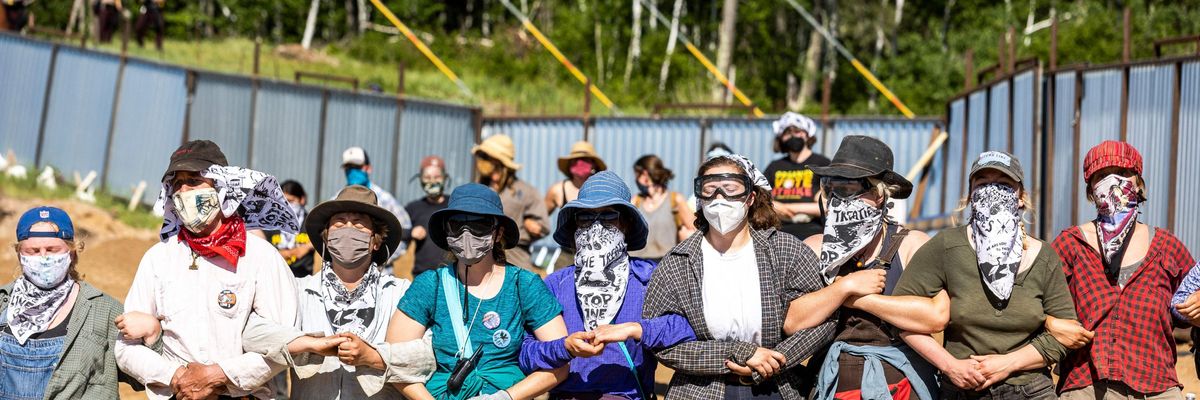In the wake of the final demise of the Keystone XL pipeline earlier this week, Indigenous leaders and climate activists on Friday implored President Joe Biden to use his executive authority to pull the plug on other destructive fossil fuel transport projects advanced during the Trump administration--from Line 3 to the Dakota Access Pipeline.
"This is about our life and our wildlife and our water."
--Winona LaDuke, Honor the Earth
"We shuttered that zombie pipeline," Joye Braun, national pipelines organizer with the Indigenous Environmental Network, said of Keystone XL during a press call with fellow climate champions. "It's time for the Biden administration to make good on his promises. They promised they wanted to get it right with tribal leaders."
On the first day of his presidency, Biden fulfilled his campaign vow to rescind a Trump-issued federal permit that allowed construction of the Keystone XL pipeline in the United States.
But in signing the "NoKXL Pledge" on the campaign trail, Biden also committed to halting the Dakota Access Pipeline--which the Trump administration granted final approval--as well as other oil and gas projects that would "exacerbate our climate crisis."
Biden, however, has been conspicuously silent on major fossil fuel projects such as Enbridge's Line 3, a tar sands pipeline whose construction has sparked mass protests and civil disobedience in northern Minnesota.
"How can anyone with a straight face not reject Line 3. It's exactly the same size and it's carrying the same stuff [as Keystone XL]," 350.org co-founder Bill McKibben said Friday.
On Monday, around 2,000 Indigenous water protectors and allies converged near a Line 3 construction site near Minnesota's Itasca State Park, where they were met by local law enforcement and a low-flying Department of Homeland Security helicopter. Nearly 250 demonstrators were reportedly arrested during the day of action against the pipeline, a multi-billion-dollar expansion project that would have the equivalent climate impact of 50 new coal-fired power plants and 38 million new gasoline vehicles on U.S. roads.
During Friday's press call, climate leaders called on Biden to apply the same standard to Line 3 and other "Trump pipelines" that he applied to Keystone XL, which the president characterized as a threat to the planet that also "disserves the U.S. national interest."
"This is about our life and our wildlife and our water," said Winona LaDuke of Honor the Earth, emphasizing that direct action against the Line 3 expansion will continue until the project is killed. "This pipeline made no sense seven years ago. It makes less sense now."
Mike Brune, head of the Sierra Club, added that the crucial question facing the administration is, "Will these Trump pipelines become Biden pipelines?"
"If there's a simple ask of the Biden administration, it's to revoke any permits that were granted under Trump for these risky pipelines."
--Jane Kleeb, Bold Nebraska
"We are in a hole. Will we stop digging?" Brune continued. "We know that to solve a problem, you have to start by not making it worse. If we want to address historical inequities, we have to stop perpetuating them. If we want to have clean water, we have to stop poisoning it. If we want to solve the climate crisis, we can't make it worse."
To the dismay of climate justice campaigners, the Biden administration has recently gone to bat for Trump-era fossil fuel initiatives in court, including an Alaska drilling project that is expected to produce up to 160,000 barrels of oil a day over 30 years. Biden's Army Corps of Engineers has also formally opposed a shutdown of the Dakota Access Pipeline, which carries hundreds of thousands of barrels of oil per day from North Dakota to Illinois.
Environmentalists have warned that such actions by the administration run directly counter to Biden's already-inadequate pledge to slash U.S. carbon emissions by at least 50% compared to 2005 levels by the end of the decade and transition away from planet-warming fossil fuels.
Jane Kleeb, the founder and president of Bold Nebraska, said Friday that "we are asking President Biden and Kamala Harris to stand with us."
"If there's a simple ask of the Biden administration, it's to revoke any permits that were granted under Trump for these risky pipelines," added Kleeb. "We want to see action on climate, and we want to see action for our families."

